Climate Change: Measurements and Effects

As we come to the close of #WorldOceansWeek, climate change is on our minds at Qubit Systems, as are the many impacts this existential threat is having on both aquatic and terrestrial environments. Monitoring the effects of climate change is the research focus of many Qubit clients. A selection of the instruments we design and manufacture to meet the needs of this critical research is highlighted below.
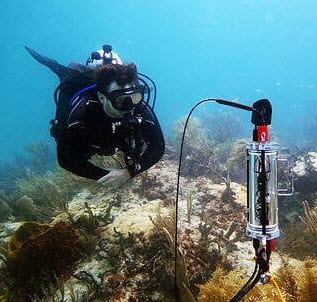
Ocean warming and acidification are devastating coral reefs worldwide. The CISME system measures coral health non-invasively by monitoring photosynthesis, respiration, and (de)calcification in situ at depths in excess of 50 meters. CISME measures oxygen fluxes and changes in pH during incubation of samples without their detachment from the reef. Water flow and light levels are controlled by the user. In addition to respiration and photosynthesis, water may be sampled for titration in the lab to measure total alkalinity. From this, the calcification rate may be calculated. The sample loop can also be used to introduce substances to the sample that might affect metabolism, such as acidified seawater for ocean acidification studies. Ports in a customized CISME sample chamber (optional) allow fiber-optic measurements of chlorophyll fluorescence (fluorometer required).
See: Romano de Orte M. et al. 2021 Unexpected role of communities colonizing dead coral substrate in the calcification of coral reefs. Limnology and Oceanography March 17, 2021 https://doi.org/10.1002/lno.11722
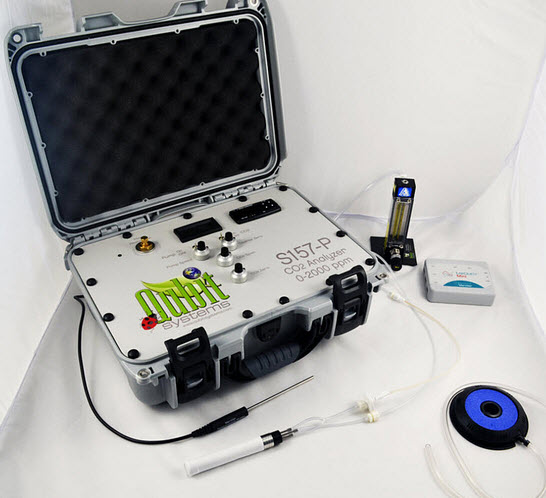
Dissolved CO2 Analysis
While measurements of pH can provide estimates of dissolved CO2 concentrations, Qubit’s NDIR dissolved CO2 systems measure gas concentrations directly at extremely high resolution. In the Standard system, a DCO2 sampler covered with a PTFE (polytetrafluoroethylene) membrane can be submerged in water up to 60 cm depth. Dissolved CO2 diffuses across the membrane into the sampler and is carried to the NDIR CO2 analyzer for measurement in a closed-loop fixed-volume gas stream. Flow past the sampler is necessary and stirring is required for the system to work well. A Rapid Response DCO2 System with a flow-through design is also available. It uses a DCO2 sampling system in which water is circulated through silicone tubules while gas passes on the other side of the tubules in the opposite direction. CO2 diffuses across the tubules into the gas stream for analysis. Complementary sensors for measuring temperature, salinity, and pH may be added to the system.
As with all Qubit equipment, we provide sophisticated software for data display, analysis, and manipulation. All raw data are saved and may be downloaded into other software packages.
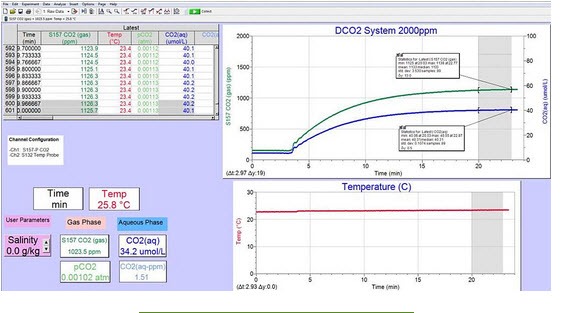
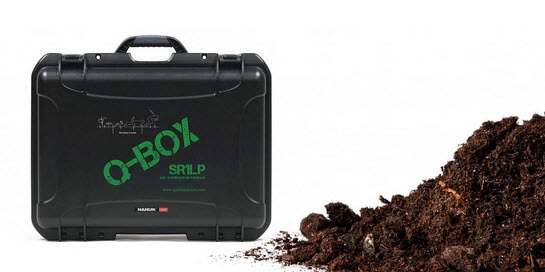
Q-Box SR1LP Soil Respiration Package
Soils sequester huge amounts of greenhouse gases, and disturbed soils can be significant sources of GHG emissions. Qubit’s Q-Box SR1LP Soil Respirometry Package is a fully integrated, modular research system for measuring CO2 flux from soils. A collar is placed in the soil with minimal disturbance and a chamber fitted to it. The battery-powered, field-portable Q-BOX SR1LP incorporates a high-resolution NDIR CO2 analyzer, temperature probe, pump, and flow monitor, and measures CO2 accumulation in the chamber over a short incubation period. A separate chamber is provided for monitoring respiratory CO2 flux from soils sampled and taken to the lab. The Q-BOX SR1LP sells for $9800 USD.
See: Robertson LM et al (2020) Geochemical and mineralogical changes in magnetite Fe-ore tailings induced by biomass organic matter amendment. Science of the total Environment 724: 138196 https://doi.org/10.1016/j.scitotenv.2020.138196
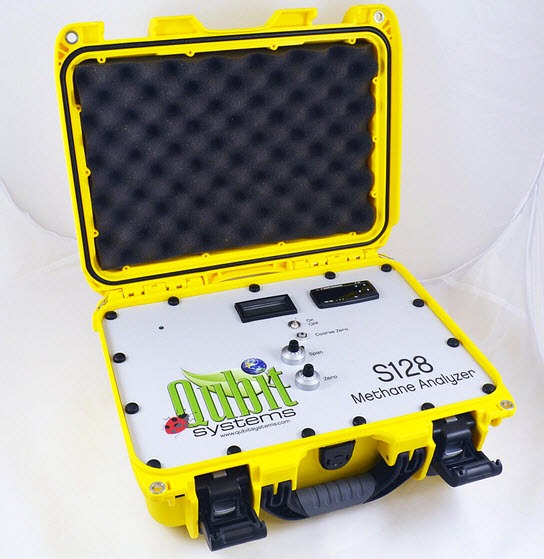
Methane Analyzers
Methane is more than 25 times more potent than CO2 at trapping infrared radiation, and emission of methane from livestock, soils, and landfills is a major source of greenhouse gas. Qubit’s S128 Methane Analyzer uses non-dispersive infrared technology (NDIR) to measure methane levels in a flowing gas at 0-5000ppm. For lower range measurements (0-500ppm) our S129 Methane analyzer may be used. These instruments are equipped with a digital display that provides a measure of the methane concentration in units of ppm and output analog signals (0 – 5 VDC) for data logging with our optional software and data interface. We also provide a high-resolution S127 Methane Analyzer that uses metal oxide semiconductor technology to measure methane in the range of 0 – 100 ppm. All methane analyzers may be used as a component of Qubit’s integrated gas exchange systems (single or multi-channel).
To see the methane analyzer in use click here: https://www.youtube.com/watch?v=ABazVihVQGw
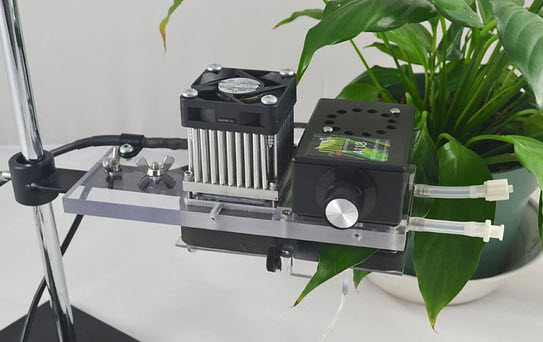
Q-Box CO650 Plant CO2 Analysis Package
Climate change can have dramatic effects on photosynthesis and transpiration, driving research towards the development of drought-tolerant crops. The CO650 Package has been redesigned to incorporate a temperature-controlled chamber capable of rapid control of leaf temperature at user-defined values from 15C below to 15C above ambient temperature, irrespective of irradiance. The system, which incorporates a high resolution NDIR CO2 analyzer, pump, mass flow meter and a temperature/RH analyzer, is used to measure photosynthesis, transpiration and water use efficiency in the laboratory and field (with optional battery pack). It can be used with our gas mixing and control systems to produce A:Ci curves, and be integrated with our gas switching system for multichannel measurements with a single suite of analyzers. Qubit can design and build customized sample chambers for a range of plant species. The Q-Box CO650 system starts at $12,700 US.
See: Yathisha NS et al. (2020) Vegetative desiccation tolerance in Eragrostiella brachyphylla: biochemical and physiological responses. Heliyon 6, Cell Press Online https://doi.org/10.1016/j.heliyon.2020.e04948
Testimonial
I have been using one of your CO2 monitoring systems for atmospheric CO2 measurements, successfully and continuously since 2010 and would like to thank you for manufacturing such a reliable instrument.

